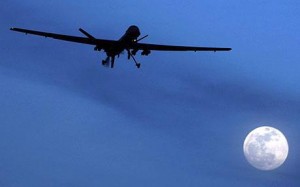Special to WorldTribune.com
WASHINGTON — Yemen has approved a U.S. plan to expand and streamline unmanned
aerial attacks on Al Qaida.
Officials said the administration of President Barack Obama has won
Sanaa’s approval for an expanded UAV campaign against Al Qaida in the Gulf
Arab state.

They said the CIA and Joint Special Operations Command, which
direct operations in Yemen, would not require permission for air strikes against Al Qaida in the Arabian Peninsula.
“There would be much greater leeway on our side to determine and track targets,” an official said.
Under the new policy, launched in April, U.S. commanders would be
allowed to quickly identify and target suspected Al Qaida operatives. They
said the policy could reduce the process of approving a strike by the
Predator combat UAV from days to hours.
Officials said neither the CIA nor JSOC would be required to name the Al
Qaida target. Instead, the agencies, winning a bureaucratic fight that began
about a year ago, must merely present evidence through such methods as
signals communications, field agents or air surveillance that the target was
providing significant help to AQAP.
Officials said the White House pressed Yemeni President Abed Rabbo
Mansour Hadi to expand U.S. operations against suspected AQAP targets. They said Hadi was promised significant U.S. military and security help to stabilize Yemen amid threats by Al Qaida and Iran.
On April 26, at least three suspected AQAP fighters were killed in a
U.S. UAV strike in southern Yemen. This marked the 13th strike in 2012 in what officials acknowledged marked an expanded UAV campaign against Al Qaida, which operates in at least three provinces in southern Yemen.
Hadi was said to have approved the U.S. operations on condition that he could suspend the campaign without notice. Officials said Hadi was concerned
that UAV strikes would target tribal fighters not directly linked to Al
Qaida.
On April 24, FBI director Robert Mueller briefed Hadi on the latest
threats from AQAP. Mueller was said to have also discussed U.S. training and
other assistance to Yemeni security forces.
“President Hadi emphasized that he is strongly committed to combating
extremism and working with the U.S. to counter the mutual threat of
terrorism,” Yemeni embassy spokesman Mohammed Al Basha said.

You must be logged in to post a comment Login